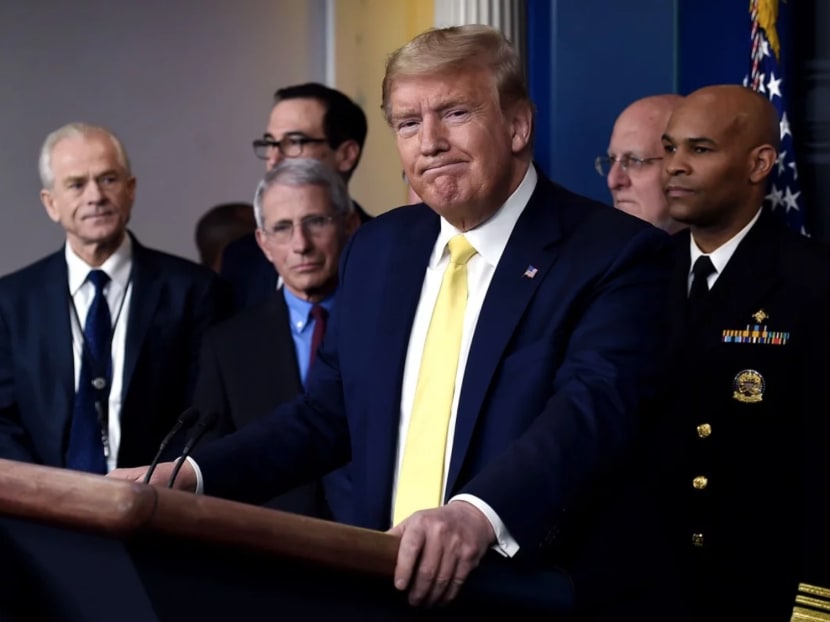Defying Beijing, Donald Trump doubles down on use of ‘Chinese virus’ label for Covid-19
BEIJING — US President Donald Trump on Wednesday (March 18) doubled down on his recent use of the term “Chinese virus” to refer to Covid-19, saying he was simply referring to the virus’ place of origin and that the expression was not racist.

US President Donald Trump has continued to refer to Covid-19 as the “Chinese virus”, sparking Beijing’s ire.
BEIJING — US President Donald Trump on Wednesday (March 18) doubled down on his recent use of the term “Chinese virus” to refer to Covid-19, saying he was simply referring to the virus’ place of origin and that the expression was not racist.
In a show of defiance against Chinese anger over the use of the term, the president used it within seconds of the start of the daily press conference of his Covid-19 task force, saying: “There’s some important developments in our war against the Chinese virus”.
“No, no, it’s not racist at all … It comes from China,” Mr Trump said when asked why he was using the term amid rising reports of racism against Americans of Chinese ethnicity.
“I have great love for all of the people from our country but, as you know, China tried to say at one point … that it was caused by American soldiers. That can’t happen. It’s not going to happen, not as long as I am president. It comes from China,” Mr Trump said.
“Not think; I know,” he said when asked again whether it was definitive that the virus originated from China.
Last Thursday, Beijing’s foreign ministry spokesman, Zhao Lijian, wrote on Twitter that the virus may have originated from the US Army, which took part in Military World Games in Wuhan last October. In response, the US summoned China’s Washington ambassador Cui Tiankai this week to complain about the tweet.
In posts on the social media platform, which is banned in China, Zhao also shared articles from the Canadian conspiracy site Global Research that suggested Covid-19 had originated in the US.
At Wednesday’s media conference, Mr Trump demurred when asked about a CBS reporter’s Twitter post on Tuesday that a White House official had referred to the virus as “Kung Flu” during a private conversation. “No, not at all,” he said when asked if the term put Asian-Americans at risk. “They probably would agree with it 100 per cent, it comes from China.”
Mr Trump also said he had no plans to ease tariffs on China, amid calls for him to do so by American industry groups. “China is paying us billions and billions of dollars in tariffs, and there's no reason to do that. They haven't even spoken to me about that,” the president said.
The press conference – the third consecutive daily briefing fronted by Mr Trump — saw a continuation of his dramatic shift of tone regarding the virus, after weeks of downplaying its severity. “We're going to defeat the invisible enemy, I think we're going to do it even faster than we thought,” Mr Trump said. “And it will be a complete victory. It'll be a total victory.”
The president’s comments came as already-strained ties between the two superpowers further soured this week, with both sides trading barbs — and conspiracy theories — over who was ultimately responsible for the spread of the coronavirus.
China has reacted with fury at Trump’s and his Republican allies’ insistence on calling the ailment the “Chinese coronavirus” or the “Wuhan virus”.
Those names ignore the World Health Organisation’s (WHO) repeated calls for all countries to use the officially assigned terminology — Covid-19 for the disease, and SARS-CoV-2 for the virus that causes the illness.
While epidemics’ names in the past had been based on where most of the infections occurred, the WHO in 2015 issued new guidelines to avoid contagions being identified by geography; the Middle East Respiratory Syndrome was one such example.
The Congressional Asian Pacific American Caucus in a statement on Tuesday said referring to Covid-19 as the “Chinese virus” was akin to “telling people who to blame, they are telling people who to fear and who to hate”.
“Unfortunately, we have already seen how this bigotry has impacted Asian-Americans across the country who are facing increased prejudice and violence,” the group said, adding that many from the community had been assaulted to the point of requiring medical care in hospitals.
“This is the consequence of spreading xenophobia, something that cannot continue to be amplified by the Trump administration and Republican members. Not now, not ever.”
China, too, has fanned diplomatic flames. In recent weeks, with the outbreak easing across the mainland, senior diplomatic officials have parroted the theory that the virus did not originate in the central Chinese city of Wuhan, as has been widely presumed by scientists.
Beijing also provoked anger in Washington on Tuesday when it moved to expel at least 13 American journalists from China by revoking their visas in retaliation for Washington’s move last month to curb the number of journalist visas it issued to staff from five Chinese state-owned media outlets.
The Chinese action affects journalists from The New York Times, The Washington Post and The Wall Street Journal.
Asked for reaction to the journalists’ impending expulsion, Mr Trump — who frequently disparages “fake news” outlets he does not like — said: “I am not happy to see it. I have my own disputes with all three of those media groups. I think you know that very well, but I don't like seeing that at all.” SOUTH CHINA MORNING POST









